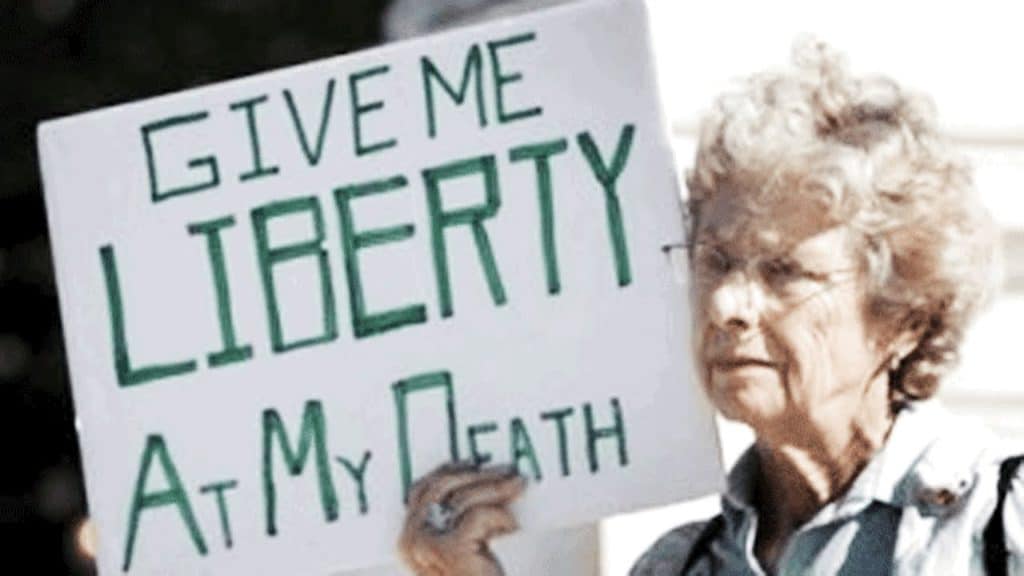
By Dan Murphy
The Medical Aid in Dying Act was introduced Jan. 28 in the Assembly by its main sponsor, Westchester Assemblymember Amy Paulin. Another Westchester Assembly member, Tom Abinanti, is a co-sponsor to the bill, which, if enacted, would allow mentally capable, terminally ill adults with six months or less to live to have the option to request a doctor’s prescription for medication they can decide to take to peacefully end their suffering, if it becomes unbearable.
The issue of helping a loved one with a terminal illness end their life took center stage in Westchester last summer when Richard DeLucia ended his wife, Ann’s suffering by shooting her and then taking his own life at the Westchester Medical Center.
Paulin, who introduced similar legislation in 2017 and last year, has been at the forefront of discussing the matter with the Westchester community and supporting legislation to permit medical aid-in-dying legislation:
“If I am terminally ill, I should be able to choose to end my life calmly, peacefully and in a dignified way, at a time and in a setting I choose where I am surrounded by those I love,” she said. “That is what my bill is about.” Paulin’s legislation is supported by the New York State Academy of Family Physicians, NYS Public Health Association and the New York Statewide Senior Action Council.
The League of Women Voters of New York also supports the legislation. “The League of Women Voters of New York believes state laws should grant the option for a terminally ill person to request medical assistance from a relevant, licensed physician to end one’s life,” stated LWV. “The League of Women Voters believes such legislation should include safeguards against abuse of the dying and protections for medical personnel who act in good faith compliance with the law.”
The Medical Society of the State of New York opposes the bill, as does a group called Not Dead Yet.
“Many disability rights organizations oppose the legalization of assisted suicide, which is a dangerous and harmful public policy, creating a discriminatory double-standard under which some suicidal people get suicide prevention while others get suicide assistance, depending on their health and disability,” said Diane Coleman, president Not Dead Yet.
“When assisted suicide is legal, it’s the cheapest treatment available – an attractive option in our profit-driven health care system. Terminal diagnoses and prognoses are too often wrong, leading people to lose good years of their lives. If one doctor says ‘no,’ people can ‘doctor shop’ for another who says ‘yes.’ No psychological evaluation is required, putting depressed people in danger.
“The highly touted ‘safeguards’ turn out to be truly hollow, with no real enforcement or investigation authority,” continued Coleman. “Assisted suicide is a prescription for abuse: an heir or abusive caregiver can steer someone toward assisted suicide, witness the request, pick up the lethal dose, and in the end, even administer the drug – no witnesses are required at the death, so who would know? Many other pressures exist that can cause people with compromised health to hasten their death.
“Evidence appears to show that assisted suicide laws also lead to suicide contagion, driving up the general suicide rate. People already have the right to good pain relief, including palliative sedation if dying in pain. No coverage of the assisted suicide issue is fair and balanced without the perspective of New York disability organizations and individuals who oppose it.”
“The mere suggestion that disability acquired as the result of illness is cause enough to end one’s life is a devaluation of disabled peoples’ lives, and it’s offensive,” added Kathryn Carroll, an attorney and policy analysis with the Center for Disability Rights. “Our focus should be on expanding access to services and supports that allow people to live with dignity, rather than assisting their suicide.”
Mel Tanzman, executive director of Westchester Disabled on the Move (wdom.org) and chairperson of the Health Committee of the New York Association on Independent Living (ilny.org) said: “Fears of becoming disabled and facing functional loss, whether the cause is injury or illness, are often reported by doctors as reasons patients request assisted suicide in states where it is legal. Oregon released data from 2017 which showed that the top three end-of-life concerns cited by Oregon patients requesting suicide pills had nothing to do with physical pain and suffering.
“These concerns were decreasing ability to participate in enjoyable activities, loss of autonomy and loss of dignity. The disability community strongly opposes the belief that requiring the assistance of another individual for activities of daily living, such as dressing, bathing and toileting, is undignified or a legitimate reason for New York State to legalize physician assisted suicide.”
Polling data shows support for medical aid-in-dying legislation. A recent Quinnipiac University Poll showed NYS voters’ support 63-29 percent, “allowing doctors to legally prescribe lethal drugs to help terminally ill patients end their own lives.” Other statewide and national polls all show a majority of New Yorkers and Americans supporting medical aid-in-dying legislation.
Ida Schmertz, a New York City resident and survivor of multiple cancers, including Chronic Lymphocytic Leukemia, said: “Over the past 20-plus years, I have taken every medication known for these diseases and I’ve been in and out of seven hospitals in the U.S. and Europe. As of this year, the disease is in remission. When CLL reappears, the Medical Aid in Dying Act would allow me the option to die as we all would wish – at home, surrounded by family and loved ones and on our own terms.”
Lindsay Wright, a York City resident and wife of former New York University professor of politics Youssef Cohen, who advocated for medical aid-in-dying legislation in New York while he was dying from incurable mesothelioma, said: “People from all walks of life, beliefs and backgrounds want better end-of-life options, including compassionate palliative care, fewer and less invasive end-of-life interventions, and more autonomy in how they will die, especially when they have a terminal illness. And they – we – want that option right here in New York where we live.”
Timothy Quill, a professor of medicine, psychiatry, medical humanities and nursing at the University of Rochester Medical Center, and founding director of the university’s palliative care program, added: “We are asking you to consider authorizing the Medical Aid in Dying Act as a last resort for terminally ill patients who feel they do not otherwise have acceptable options. Twenty years of data from Oregon suggest strongly that this practice can be legally regulated, and that it enhances rather than undermines palliative care and hospice.”
If the Medical Aid in Dying Act is enacted into law, it would make New York the ninth state in the nation to authorize medical aid-in-dying as an end-of-life care option. Oregon, where medical aid-in-dying has been authorized for two decades (since 1997), has been joined since then by Washington (2008), Montana (2009), Vermont (2013), California (2015), Colorado (2016), Washington, D.C. (2017) and Hawaii (2018).
Compassion & Choices (www.compassionandchoices.org) recently released a survey of New York State physicians’ views on medical aid-in-dying. The survey – conducted by WebMD/Medscape – shows that by a 56-26 percent margin, New York doctors support medical aid-in-dying as an end-of-life care option. By an even larger 67-20 percent margin, New York doctors support proposed legislation to authorize medical aid-in-dying.
Paulin said: “Medical aid-in-dying is an important end-of-life option that polls have consistently shown most New Yorkers believe ought to permissible in specific circumstances and with appropriate safeguards. Based on this new honest, legitimate data, it’s clear that a strong majority of doctors concur that lawmakers should allow this option for their patients who are suffering irreversible, terminal conditions.”
Donna Lieberman, executive director of the New York Civil Liberties Union, added: “Deciding what medical care is best for you is among the most personal decisions you can make. No New Yorker should be forced to suffer, particularly when facing terminal illness. The New York Medical Aid in Dying Act would give patients and their families comfort during the most difficult of times by giving individuals control over how their lives end. The right to make decisions about your body is central to American values of liberty and autonomy, and with this legislation, New York is showing what it means to defend those values.”
A companion bill in the State Senate was also introduced for 2019. No vote has yet to be taken on either bill, which would then go to the governor for his signature, if approved.
The NYS Legislature had considered physician-assisted dying bills a number of times since Oregon’s law passed: in 1995 (S 1683, S 5024-A, A 6333), 1999 (SB 4834), 2001 (SB 677), and 2012 (AB 9360).
In May 2016, a state appellate court upheld a lower-court ruling that state residents have a right to refuse medical treatment, but physicians do not have the right to help them die.





